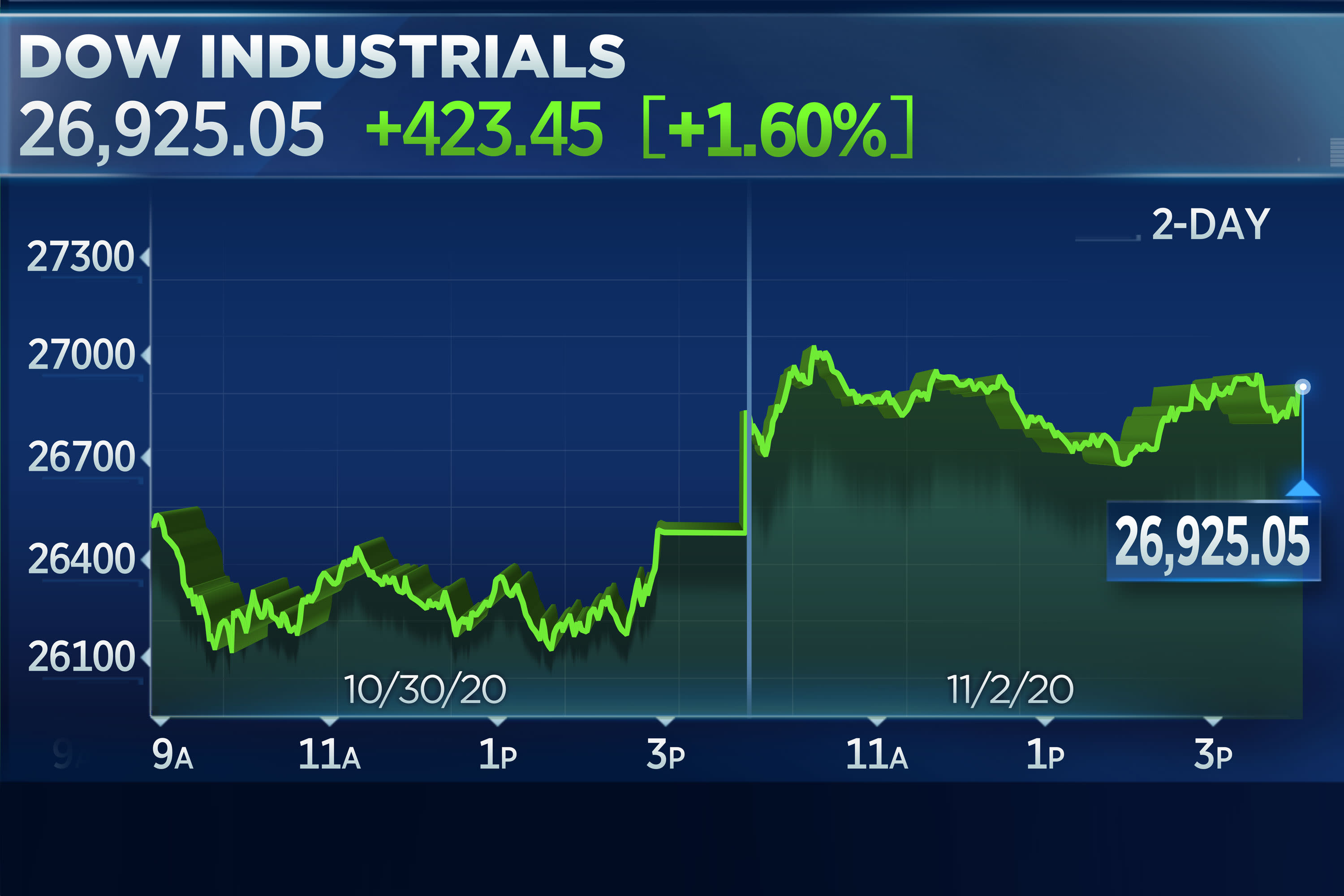Stocks rebound from last week’s sell-off, Dow jumps more than 400 points

Stocks jumped on Monday, the first trading day of the month, as markets tried to recover from a brutal week and month ahead of the U.S. presidential election.
The Dow Jones Industrial Average traded 422 points higher, or 1.6%. The S&P 500 gained 1.6% and the Nasdaq Composite advanced 0.7%.
“If you’re really short, you’re really betting that everything has to go wrong at this point,” CNBC’s Jim Cramer said on “Squawk on the Street,” referring to investor concerns over a delayed or contested election result on Tuesday. “[The market] really got oversold last week and it’s entirely possible that we elect someone tomorrow.”
Ahead of Tuesday’s election, Joe Biden holds a substantial national lead over President Donald Trump. The former vice president garnered 52% of support from registered voters versus 42% for the president, according to a NBC News/Wall Street Journal poll from Sunday. Investors betting on a potential Biden victory increased positions on solar stocks. The Invesco Solar ETF (TAN) rose more than 2.7%.
The Senate election could also be crucial for the markets as many key policy shifts including further fiscal stimulus hinge on who holds the majority control.
“The world is still largely in a holding pattern as investors await clarity on the U.S. election,” Adam Crisafulli, founder of Vital Knowledge, said in a note Sunday. “The world will likely be a lot clearer in just a few days thanks to the election being over, stimulus talks resuming in Washington, [and] further central bank support.”
The major averages are coming off their worst week since March 20 as coronavirus cases surged, fiscal stimulus negotiations fell apart and as shares of mega-cap tech companies including Apple and Amazon slumped following their quarterly earnings reports. Those losses led to sharp monthly declines for the major averages. The Dow, S&P 500 and Nasdaq posted their first back-to-back monthly losses since March.
Some on Wall Street believe the sell-off leading up to Election Day gives the market less downside risk to a contested result.
“Even though we’re worried that there could still be one more wave down if we get another big influx of uncertainty, we think the stock market is now setting up nicely for a nice net advance over the next two months or so,” Matt Maley, chief market strategist at Miller Tabak, said in a note on Sunday.
Mike Wilson, chief U.S. equity strategist at Morgan Stanley, thinks investors should start buying stocks after the recent pullback, “but selectively.”
“The worst of the correction is over in our view but we still think the next month is likely to remain volatile and uncertain as we navigate what is shaping up to be a much closer election than expected just a few weeks ago and risk of further lockdowns as the virus runs its course,” Wilson said in a note.
The major averages hit their session highs on Monday after Institute for Supply Management said its manufacturing index reached a two-year high in October. The market’s comeback came even as England adopted a stay-at-home order to fight the coronavirus.
Prime Minister Boris Johnson announced Saturday England is closing all nonessential businesses for the next four weeks after more than 22,600 weekly Covid-19 cases were reported for the U.K., far higher than its first peak of 4,800 average weekly cases in the spring. People will be ordered to stay at home unless it’s for essential purposes, Johnson said.
The U.S. is also grappling with rising new coronavirus infections. The nation reported 99,321 new Covid-19 cases on Friday, beating its previous record set only a day prior, according to Johns Hopkins University. The top five records in daily cases have all been reported within the last eight days.
Subscribe to CNBC PRO for access to the livestream of CNBC’s continuous election and business news coverage.




